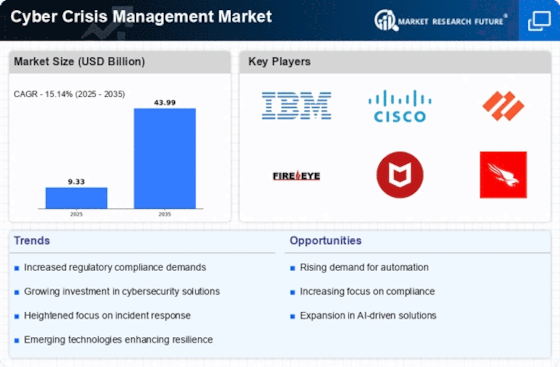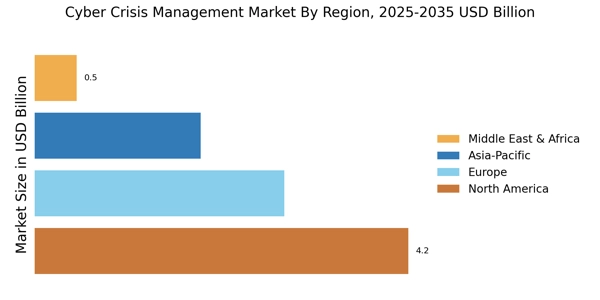Rising Cyber Threats
The Cyber Crisis Management Market is experiencing a surge in demand due to the increasing frequency and sophistication of cyber threats. Organizations are facing a myriad of cyber risks, including ransomware attacks, data breaches, and insider threats. According to recent data, the number of reported cyber incidents has escalated by over 30% in the past year alone. This alarming trend compels businesses to invest in robust cyber crisis management strategies to mitigate potential damages. As a result, the market for cyber crisis management solutions is projected to grow significantly, with estimates suggesting a compound annual growth rate of around 15% over the next five years. This growth reflects the urgent need for organizations to enhance their preparedness and response capabilities in the face of evolving cyber threats.
Technological Advancements
The Cyber Crisis Management Market is being shaped by rapid technological advancements that enhance crisis management capabilities. Innovations in artificial intelligence, machine learning, and automation are enabling organizations to detect and respond to cyber incidents more effectively. These technologies facilitate real-time threat analysis and incident response, allowing businesses to minimize the impact of cyber crises. Furthermore, the integration of advanced analytics into crisis management solutions is expected to provide organizations with deeper insights into potential vulnerabilities and threats. As a result, the market is likely to witness a shift towards more sophisticated and automated crisis management tools, which could lead to improved resilience against cyber threats and a more proactive approach to crisis management.
Regulatory Compliance Pressure
The Cyber Crisis Management Market is increasingly influenced by the stringent regulatory landscape that organizations must navigate. Governments and regulatory bodies are implementing more rigorous compliance requirements related to data protection and cybersecurity. For instance, regulations such as the General Data Protection Regulation (GDPR) and the California Consumer Privacy Act (CCPA) impose hefty fines for non-compliance, thereby driving organizations to adopt comprehensive cyber crisis management frameworks. The pressure to comply with these regulations is likely to propel the demand for specialized crisis management solutions, as businesses seek to avoid penalties and protect their reputations. This trend indicates a growing recognition of the importance of proactive crisis management in maintaining compliance and safeguarding sensitive information.
Increased Awareness and Training
The Cyber Crisis Management Market is benefiting from a heightened awareness of cybersecurity issues among organizations and their employees. As cyber threats become more prevalent, companies are recognizing the necessity of investing in comprehensive training programs to equip their workforce with the skills needed to identify and respond to potential crises. This trend is reflected in the growing allocation of resources towards cybersecurity training initiatives, which are essential for fostering a culture of security within organizations. Enhanced training not only prepares employees to handle cyber incidents more effectively but also contributes to the overall resilience of the organization. Consequently, the demand for cyber crisis management solutions that incorporate training and awareness components is expected to rise, further driving market growth.
Shift to Remote Work Environments
The Cyber Crisis Management Market is experiencing a transformation due to the shift towards remote work environments. As organizations adapt to flexible work arrangements, they face new challenges in securing their digital assets and managing cyber risks. Remote work has expanded the attack surface for cybercriminals, making it imperative for businesses to implement robust cyber crisis management strategies tailored to remote operations. This shift is prompting organizations to invest in solutions that address the unique vulnerabilities associated with remote work, such as unsecured home networks and personal devices. The increasing reliance on cloud-based services and collaboration tools further underscores the need for effective crisis management solutions. As a result, the market is likely to see a rise in demand for tailored crisis management strategies that cater to the evolving landscape of remote work.

















